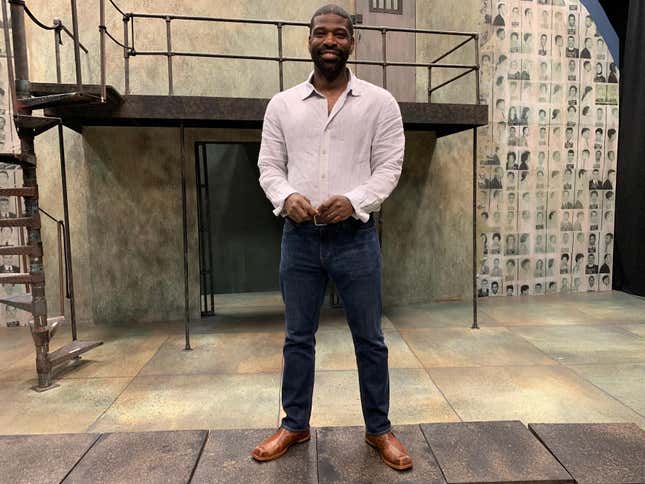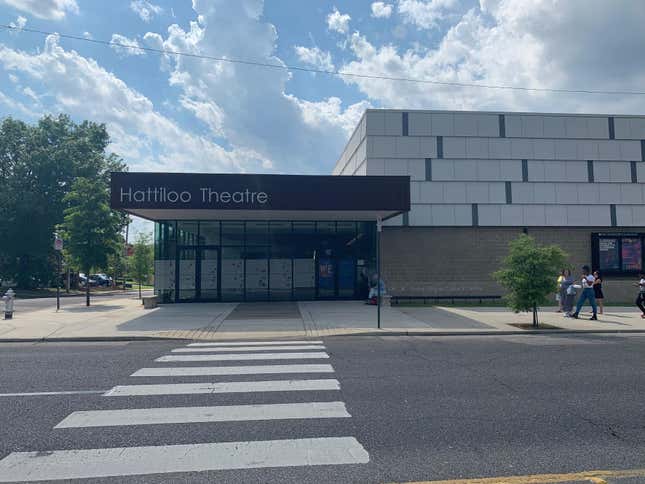
MEMPHIS—When Ekundayo Bandele invited a group of journalists to tour Hattiloo, his independent theater in Memphis, he spoke as much about the community surrounding it as he did the plays performed inside. For most people who want to visit Hattiloo Theatre, they’d just go online and buy tickets. But for kids who live in certain neighborhoods north of Memphis the theatre needs to come to them.
In these gang stricken neighborhoods, kids couldn’t get to local community centers to attend Hattiloo arts outreach programs without fear of being attacked. They need a hood pass—literally. So Bandele did what any theater director would do: negotiate safe passage for the kids.
After a talk with the gang members, the kids were allowed through.
“A big part of this is outreach,” Bandele told The Root back in May. “Memphis has a lot of poverty. There are a lot of invisible walls around depressed neighborhoods. It’s our job to tear down those walls. And we do that by ensconcing ourselves in that community.”
When Bandele talks about independent black theater, it’s more than artistic expression. It’s a way of life, a lifeline that breathes into the soul of everyone who lives around the physical structure. It is a safe space, not only for black artists but for black people who may never set foot in the theater.
Bandele invited a group of journalists to his theater for a May 15 tour to discuss how his theater, one of the few independently black-run in the nation, started from a one-man operation in a small storefront in the Edge District in 2006 to now employing more than a dozen full-time employees and hosting eight performances a week during the season. The current theater was built in 2014 after a $4.3 million capital campaign and another $900,000 raised in 2016 to build the Hattiloo Development Center.
The annual operating budget is $1.7 million, up from $40,000 in 2006.

One thing that’s clear when you see Hattiloo is this: for us, by us. Painted on the sides of the building is a timeline of black achievements and historical markers starting at Jamestown, Va., 1619. When you enter the building, you see a huge “NO LATE SEATING POLICY” placard that says if you don’t come on time, you’ll have to wait until intermission or exchange your ticket for another performance you can make on time.
“When you pay $35 to come see our play, that’s a contract,” Bandele told the group. “We’re gonna keep our word to you and you’re gonna keep your word to us. Therefore, if we start at 3:05, we just broke our word because we told you on our email, on our press, everything, we start at 3.”
As Bandele escorted us through the theater, we walked past photographs of legendary Memphis actors and portraits of black artists like August Wilson and James Baldwin—all commissioned by local black talent. It is Bandele’s commitment to ensuring the wider artist community benefits from the success of Hattiloo.
Several times a month, the theater hosts free events for the public. In April, Bandele led a “lay in” in which all of the windows were blacked out, the air was turned off and the blasting sound of a slave ship filled the room as people laid on the ground shoulder to shoulder, head to toe for eight minutes. And everyone spoke about it afterwards. More than 200 people showed up.
There are two main theaters: the main stage, which can hold up to 158 people, and the Black Box Theatre, which seats up to 48 people. Both feature performances directed and performed almost exclusively by black artists. This upcoming season’s lineup includes works from Danai Gurira (Eclipsed), Dominique Morisseau (Detroit 67), Tracey Scott Wilson (Buzzer) and Joyce Sylvester (Women in the Pit).
Bandele is not a Southerner by birth. Born to parents originally from Memphis, Bandele grew up in Brooklyn, N.Y., and spent time between both cities before the Morehouse College and Tennessee State University alum settled in Memphis with his wife and daughters in 2004. The name Hattiloo was inspired by his daughters’ nicknames: Hatshepsut Bandele (Hatti) and Oluremi Bandele (Loo).
Sixty percent of the theater attendees are black and 40 percent are white. It is a balance that matches Memphis’s racial demographics, as 63.9 percent of the city is black. I asked Bandele if he’s run into donors who encouraged him to tone down the blackness of the theater.
His answer sums up why Hattiloo is needed in Memphis in the first place.
“I remember having a donor say, ‘Why don’t you do Neil Simon or why don’t you do this?’ And I said, ‘I ain’t giving my stage to a white person for a month when you can go across the street and see him or at the university and see or at Theater Memphis and see it. But who else is going to do August Wilson? Who else is going to do Suzan-Lori Parks? Who is going to do Katori Hall? That’s our responsibility.”

